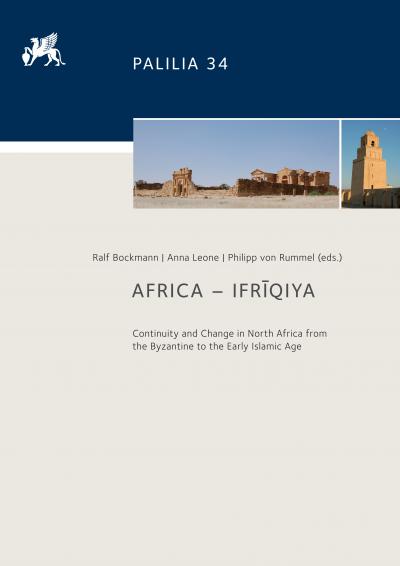Africa – Ifrīqiya: Continuity and Change in North Africa from the Byzantine to the Early Islamic Age. Papers of a Conference held in Rome, Museo Nazionale Romano – Terme di Diocleziano, 28 February – 2 March 2013
https://doi.org/10.34780/l8a5-8cmw
Synopsis
‘Africa – Ifriqiya’ is dedicated to the study of the transformational period that marked the end of Antiquity in the southern Mediterranean: the transition between east Roman, or Byzantine, and Arabic (and ultimately Islamic) rule over what eventually came to be known as the Maghreb, the former territory of Roman North Africa. It brings together current research by internationally renowned experts from Europe, North Africa, Australia, and the USA who have contributed important work in recent years to the study of this period.
The sections in this book cover historical questions, the fields of religion and urbanism, and developments in landscapes and the economy. A wide range of topics is discussed, including church building, the founding of early mosques, military history, and the ideology of political centres. A number of articles feature detailed presentations and discussions of Arabic sources. Many of the contributions present recent archaeological research, making material evidence available for the post-Roman phases in a number of exemplary sites such as Carthage, Kairouan, Ammaedara, and Chimtou. Settlement topography and economic developments are analysed from broad perspectives, while regional studies focus on particular areas like the Tunisian Sahel and Tripolitania. Works on early Islamic coinage and pottery provide valuable information on the material culture of the transitional period.
Uniting interdisciplinary research and presenting new perspectives on the fascinating period between Antiquity and the early Islamic world, this volume furthers our understanding of how the transitional process played out on the ground in North Africa. Its contributions help to illuminate how (post-)Roman Africa slowly transformed into a new world of changing communities, diversified religious affiliations and new connections across the Mediterranean.
Chapters
-
From Africa to IfrīqiyaThe Transition from Byzantine to Islamic North Africa: an Introduction
-
The Forgotten TransitionNorth Africa between Byzantium and Islam, ca. 550–750
-
Seventh-Century North AfricaMilitary and Political Convergences and Divergences
-
L'Africa à l'époque transitoire (Ier siècle H./VIIe siècle)Contribution à l'étude du toponyme, de son évolution et de ses significations à la lumière des données numismatiques et textuelles
-
Rebuilding Christian Carthage after the Byzantine Conquest
-
Late Byantine and Early Islamic Carthage and the Transition of Power to Tunis and Kairouan
-
Carthage vue par les auteurs arabes
-
Le déplacement de la capitale provinciale de la Tripolitaine de Leptis Magna à TripoliModalités et datation
-
The Fate of the Classical Cities of Ifrīqyia in the Early Middle Ages
-
Construire, récupérer et inventerLes mosquées en Afrique du nord au VIIe siècle d'après les sources arabes
-
La nouvelle église ouest de Bulla Regia et les évêques Armonius et Procesius
-
Chimtou médiévaleLes derniers niveaux d'occupation de la ville de Simitthus (Tunisie)
-
Ammaedara, une cité d'Afrique Proconsulaire entre Antiquité tardive et Moyen Ȃge, à la lumière des recherches récentes
-
L'apport de l'archéogéographie à la restitution du plan ancien de Kairouan
-
Not Just a Tale of Two CitiesSettlements in a Northern Coastal Area of the Tunisian Sahel (Late 7th–Late 8th c.)
-
Cultural Transitions in ArchaeologyFrom Byzantine to Islamic Tripolitania
-
Land, Forts and HarboursAn Inside-Out View of North Africa to the Mediterranean between the Byzantine and Early Islamic Period
-
Marqueurs céramiques de l'Afrique byzantine tardive
-
Africa – Ifrīqyia, Conclusions




